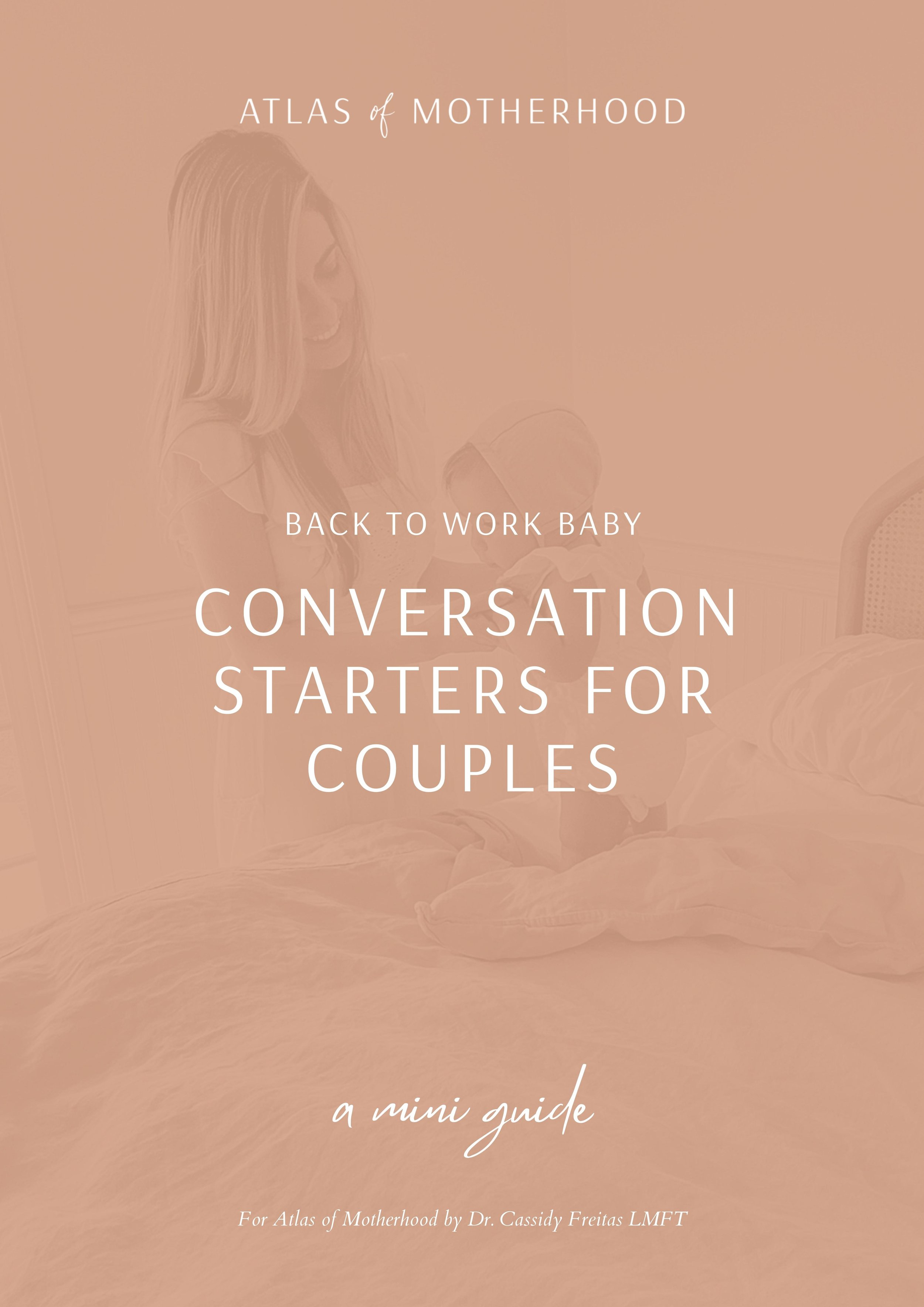Dr. Cassidy Freitas on Returning to Work, USA
Photography by: Trina Cary Photography
Supporting the transition back to work
Returning to your job after having a baby can be a major upheaval for your new family unit, and a lack of paid family leave can raise stress levels during this important postpartum period. There are new schedules to adjust to, caregivers to get to know, and complex emotions to face as you'll suddenly be apart for lengthy stretches during the day. It's enough to stress out any new mother.
So, if you, your partner, or the both of you together don’t get extended paid family leave, what are some ways you can prepare for your postpartum experience and reduce the stress involved in the return for one or both of you to work?
Dr. Cassidy Freitas, a licensed marriage and family therapist that specialises in preparing families for postpartum, shares some strategies for helping you or your partner’s return to the workforce in a way that will best prepare you both to enjoy the postpartum experience.
When your partner returns to work
The early days after a new baby arrives are a big transition for everyone in the family, and your partner’s return to work can stir up some big emotions.
“Having a baby really shakes up your unit. It is an incredibly vulnerable time and it shakes things up in a way that can be really hard. But when you are forced into this very vulnerable space there’s so much opportunity for growth, flexibility, and change. It’s a very unique opportunity to renegotiate roles, responsibilities, and boundaries.”
Common Emotions Experienced In Your Partner’s Return To Work
Anger & Resentment
We are all wired for anger. Anger can give us the energy we need to defend ourselves, set a boundary, or allow us to take action. Anger typically shows up as a secondary emotion, with the goal of protecting us from our more vulnerable experiences. This is a common emotion that pops up when our partner is returning to work as it can be difficult to express to your partner, “you’re going back to work and I’m scared” or “you are going back to work and I don’t feel like I’m equipped to do this on my own.” These are very vulnerable, difficult things to say outloud to a person close to you and so instead of expressing those more vulnerable feelings, it often results in anger, snapping at one another, or getting defensive.
Additionally, anger shows up as a primary emotion when we feel as if our rights have been violated in some way or when an injustice has been witnessed. As we transition to motherhood, anger can pop up when we don’t feel that we have received the support we needed during this monumental event in our lives. You may feel angry that the systems around you and your partner are not supporting and preparing you better to have a more egalitarian and equal division of labour in terms of roles as parents. There is also a chance that you may feel angry that you were robbed of a better, easier experience, particularly when you hear about the way other countries support mothers in this transition through paid family leave.
Fear & Anxiety
Both fear and anxiety are emotions that we are wired for and have a purpose. They pop up to give us data about the situation that we are in and the environment around us. Fear is there to show us when there is a real threat right in front of us and it turns on our stress response to keep ourselves and our loved ones safe. Anxiety can pop up when there isn’t a threat right in front of you, but you are thinking about the possible threats, and turn on that same stress response. Although they show up because of different things, fear and anxiety can produce similar symptoms and are emotions commonly experienced in the transition to motherhood because a lot of new parents are afraid.
Research shows that a new mother’s brain is changed in their postpartum period to mimic brain activity similar to a person with obsessive-compulsive disorder (OCD). A recent study observed that when listening to their babies cry, it triggered a deeply anxious neural response even in parents who hadn’t been diagnosed with a psychological problem. OCD is a psychiatric condition characterized by highly distressing thoughts (obsessions) and ritualistic behaviors (compulsions). OCD patients experience a heightened sense of anxiety and a corresponding need to compensate for those distressing thoughts with compulsive behavior, which could include incessant hand washing — or constantly checking that a newborn baby is breathing.
Dr. Cassidy says those scary, intrusive thoughts are incredibly common for new mothers. “From an evolutionary perspective, it makes sense that we are wired to be more anxious as a new mother because our ancestors had a lot of threats and were constantly on high alert. This helped to keep the mothers themselves and their babies safe, and those are the ones that survived. That survival mechanism has been passed down to us.” James Leckman, the research director of the Yale Child Study Center, says he’s found that a certain level of elevated anxiety and distress is normal in parents. In fact, he and other researchers have found that in the weeks before delivery, 95 percent of mothers and 80 percent of fathers reported OCD-type thoughts. The Yale researchers hypothesize that the healthy maternal brain is hardwired for a period of “transient OCD”.
So although a modern mother today might be in her home all day and be relatively very safe, she might have thoughts and images of very scary, horrible things happening. The idea of then being home alone with those thoughts and a brand new baby can be very overwhelming. And then once your partner has returned to work, it can be overwhelming when you are home by yourself because you’re not sharing the responsibility with someone else anymore. Your mind is telling you or showing you all of these vulnerable things that could potentially happen and your body is physiologically having a stress response to them.
Dr. Cassidy says, “In my experience working with new parents, a lot of parents are always thinking about safety. Asking themselves questions like, Is my baby breathing? Why is my baby crying? Is this a cry that I need to call the Doctor about? Is my baby getting enough milk? Am I doing this correctly?” When your partner is there, it can at least feel like you as though you have someone to share the responsibilities with, but if it's just you on your own and something happens, all of the responsibility falls onto you. This can exacerbate some of those fears.
Grief
Grief can show up when your partner returns to work as you grieve the ending of that newborn bubble as a family unit and enter into a new season. After your baby is born, there is likely a period of time when it’s just you, your partner, and your new baby. While it depends on the relationship, for many couples this postpartum period can feel like an incredibly special time where the entire outside world shuts off and it’s just you, your partner, and baby figuring out this new life together as a family . Dr. Cassidy says, “Once your partner returns to work, it can feel as though the world is pulling your partner away from your unit. It’s opening the doors to the rest of the world to re-enter your bubble.”
Whatever it is that your partner’s job looks like, whether they go into an office or they stay at home, but receive calls or emails, suddenly their mind is somewhere else, they have other stressors, and all of that is entering your little bubble. There can be grief and a sense of loss during this time in wondering when you will ever get that sort of time back when it was just you, your partner, and your new baby in your own bubble.
Dr. Cassidy explains, “Even if your partner only had two weeks off, there was still a period of time where your partner’s work potentially knew ‘we need to leave them alone’. And now that your partner is going back to work, the door is open again for these other responsibilities and people to trickle back into your lives and it’s the end to that season and chapter in your lives. A lot of mothers can feel sadness and grief around a partner being pulled away.”
To prepare mentally and emotionally for your partner’s return to work:
Share your feelings with your partner
Dr. Cassidy recommends checking in with your partner, communicating how you’re feeling, and offering tangible time boundaries. If you communicate your needs, and work together as a team, you’ll both be able to come back together with more energy for all of the demands of parenthood as well as presence for the joyful moments too.
Discuss boundaries around your partner’s work
As you are opening this door back to your partner’s job, supervisor, and co-workers and letting them back into your lives, it’s important to have conversations before the return to work about what the boundaries are going to be. Before you have kids, your partner might be more free to stay late or respond to emails outside of normal working hours. However, now that you are both parents, it’s important to have a conversation about what those boundaries are going to look like and work together to have your partner express and set those boundaries with the business that they work for, supervisor, or co-workers. Dr. Cassidy, says “I’ve seen it happen with so many couples, where a mother feels like her partner doesn’t have any boundaries with his/her job.” It can be very helpful for the person staying at home to know when they can expect their partner home. It’s working together to make a plan. For instance, your partner may have certain days that they will have to work late, and therefore, they make a commitment to come home earlier on other days. Being proactive is key. Having these conversations during pregnancy and taking steps to set these boundaries can make the transition back to work for your partner easier on your family unit as a whole. Dr. Cassidy recommends that your partner starts having these conversations early during the pregnancy, speaking with other co-workers in their workplace that have children, understanding what rights they have, and discussing with their employer what types of flexibility are available to them.
Plan out the coming home rituals
Dr. Cassidy says discussing the ritual of coming home is incredibly important for new parents and it’s essential to discuss your individual needs. There are so many different ways in which the ritual of coming home can be triggering. There are needs that need to be met in that reunion of coming back together so talking about and being explicit about those rituals with your partner can be beneficial. Your partner may feel as though they will need a 15-minute decompression break when they first get home, before they take the baby. You may feel as though you’re going to need scheduled alone time when your partner returns home or when it’s their day(s) off from work. Your partner may need you to let them try and soothe the baby without you intervening, so they can keep growing their baby care confidence. You may feel as though you will need help from your partner at night to get enough sleep, because you both have jobs to attend the next day (your ‘boss’ just happens to be a baby).
“...the ritual of coming home is incredibly important for new parents and it’s essential to discuss your individual needs. ”
Dr. Cassidy explains, “I find with the couples that I work with, a lot of times a partner will come home and they have been working all day and feel like they need a moment to relax before they jump immediately into parenting. While the person at home might feel that they have been working all day just in a different way and feel like they need some time off and need to hand the baby off and be alone for a little while.”
Brené Brown has a Ph.D. in social work and is a professor at the University of Houston. In her Ted Talk, Brene Brown, shares the concept of a family gap plan. It’s a plan to check in with your partner and share how you are doing that day. You may say to your partner, “I’m operating at 10% today,” and your partner may say, “I’m operating at 60%.” Neither of you are operating at 100%, but the person with the higher percentage may take on more that day to support the person who is operating only at 10%. It is important to recognise that it isn’t going to be the same every single day, but it’s about having the conversation up front about where you are at and what you need each day. Being able to know that some days, one partner is going to need more help to recuperate than the other is. Having those types of rituals and conversations on how you will come back together as a family is important.
Practice makes (almost) perfect
Start having ‘practise’ days leading up to your partner’s return to work, so that the transition isn’t too much of a shock to the family system. Start with your partner leaving for a just a few hours to begin with and work your way up from there.
Gather friend and family support
Let your loved ones know in advance when your partner will be transitioning back to work. Line up friends and family members to stop by (but not all at once).
Talk to someone
Being alone with a newborn all day can be lonely and isolating - connecting with someone throughout the day can improve your mood and mental state.
When your return to work
When you return to work, the clash of your professional identity and your new mother identity can be difficult to reconcile after maternity leave. You may have a mix of feelings as you prepare to return to work (even if that means returning to working from home with in-house childcare). There may be excitement that you can begin having adult conversations again or that you can again embrace an important part of your identity. However, there may also be grief and anxiety in letting go of some control, asking for help, and missing some of those sweet moments that you’ve been able to soak in during your maternity leave. Returning to work can feel like an internal power struggle filled with conflicting emotions.
Common Emotions Experienced In Your Return To Work
The emotions that arise during your own return to work can be similar to the emotions that come up when your partner returns to work, but they often show up in different ways. It’s important in this transition to communicate with the people around you, so you don’t have to hold those feelings to yourself. Share with your partner how you are feeling, and ask and express what your needs are so that you can navigate this transition in a way that you still feel connected to your role as a mother and the type of mother that you want to show up as.
With all of these feelings that come up, it’s important to recognise that these are just parts of ourselves. Acknowledge these emotions as part of this experience without labeling them as bad or good. There are feelings that are giving you data about this really big transition in your life.
It’s important to understand that returning to work after baby can be a BOTH/AND experience. You can feel sad to leave your baby AND enjoy having more freedom. You can miss those slow mornings with your baby AND feel good about getting dressed in professional clothing and heading into work. You might feel guilt for leaving your baby with someone else AND also feel relief from getting support.
Dr. Cassidy recommends that if you are really struggling with this transition, therapy is a really beneficial and important step to hold space for those feelings and to be able to gain more understanding around the emotions that you are feeling for each individual person and each unique situation in terms of what that data is offering you and then understanding what to then do with that data. A therapist can work with you to answer questions like what are ways that we can reclaim those parts of your identity without feeling like that makes you a bad mother.
Resentment
Resentment is a tertiary emotion that pops up from the sense of being mistreated or an issue being unjust. Warren D. TenHouten, who has written a lot about resentment since the beginning of the century, describes resentment as the result of being subjected to inferiorization and an emotion that can arise out of powerlessness. Many mothers feel pressured to return to work before they feel ready and powerless in their choices. You may also feel resentment that your partner’s career hasn’t been impacted as much as yours.
Fear
You may fear that you are missing out on your baby’s milestones or special moments when you return to work and there may be a lot of fear around the idea of leaving your baby in the care of someone else. If you’re breastfeeding, there’s often the fear of your milk supply being impacted. And then there’s the fear on how you’ll adjust back at work with your new identity.
“There is also pressure for making those last few weeks so amazing and the truth is, when you go back you don’t stop being a mother. You are still going to have those beautiful, connecting experiences. ”
Guilt/Shame
You may feel excitement and joy for getting “a break” (even though you’re heading to work) from your baby, having adult conversations throughout the day, and for getting the ability to reconnect with those pieces of your identity. This often leaves new mothers feeling guilt and shame over the excitement they might be feeling. Guilt can be incredibly painful. It changes our inner dialogue, and how we connect, relate, and ask for help from others. Often, guilt can make mothers begin to believe that something is wrong with them. Like other emotions, guilt shows up to give us data and most often, guilt is indicating that we are out of alignment.
Sometimes, this guilt can spiral into shame which usually results from an expectation that has been put upon us by ourselves or someone else. That expectation could be shared by others (perhaps someone in your family doesn’t agree with you returning to work) or self-inflicted (you may feel as though you should want to stay at home with your baby instead of feeling excitement about returning to work). When we are too rigid in our expectations, we only end up hurting ourselves because when we feel as though we aren’t measuring up, the result is often thinking or believing that something is inherently wrong with us as a mother. When “mother guilt” turns into shame, our self-talk may sound like:
“What's wrong with me for actually wanting to leave my baby?”
“I’m such a bad mother.”
“I’m so selfish.”
“There is something wrong with me.”
Dr. Cassidy recommends unhooking yourself from the shame spiral by responding to your thoughts in a way that you would respond to a friend that you love who is going through a hard time. Dr. Brene Brown’s research on shame tells us that the antidote to shame is connection. So even though you may feel like you want to hide your vulnerability and act as though everything is fine, it is healing to open up to the right people that you trust with those feelings.
To prepare mentally and emotionally for your return to work:
Create a plan for childcare before the birth of your baby
Doing the work during pregnancy to put a plan in place, knowing who’ll be looking after your baby and what your days will look like, can reduce stress significantly because you won’t be spending those last few weeks trying to figure out not only the logistics of childcare, but also if you feel good about your childcare decision.
“One of the things I see a lot with my clients when they haven’t prepared for their return to work is that the minute they have their baby, the ‘return to work’ countdown is on,” says Dr. Cassidy. “Every mother wants to be present, but when there isn’t a plan in place, she ends up spending those last weeks of maternity leave worrying about what their childcare is going to look like.””
Find breastfeeding support
Find a resource before you have your baby that can support you in making a plan for pumping and how the baby is going to be fed when you return to work. “Trying to figure out how to pump, and the logistics of feeding your baby while working, can be incredibly stressful when you’re already postpartum and sleep deprived,” says Dr. Cassidy. Doing the preparation before birth can be incredibly helpful. Talk with your employer before you go on maternity leave about where you can pump in the office, and speak with a lactation consultant early on during your pregnancy to understand your rights/plans.
Discuss roles with your partner
Come up with a plan with your partner during pregnancy about what your roles are going to be as parents when you return to work. “Working with a therapist or taking a course, like my Prepared Postpartum course, can help you both determine what the roles are going to be in your household,” says Dr. Cassidy. “It can answer questions like: how are we both going to sleep at night? How are we going to co-parent (including during the night) so it’s not just one parent responsible for the night-time duties? Who is going to do the grocery shopping, laundry and house cleaning?” Working together to determine who’ll be responsible for keeping your household and lives running smoothly ahead of time helps reduce the stress of transitioning back to work. This plan needs to be real nitty-gritty specific. It doesn’t mean that things can’t shift or that you can’t revisit the conversation and make adjustments and changes as necessary. Dr. Cassidy explains, “It’s so easy to find yourself swooped up into different roles and responsibilities because it’s what your own family did growing up or because you only like the way you do it and have a hard time relinquishing control or because your partner doesn’t do it and so you just do it and end up getting frustrated.”
Dr. Cassidy recommends getting incredibly specific by taking all of the loads that a family carries, putting them out on the table, and deciding what makes sense so you can both feel like you are explicitly making these decisions and sharing the responsibilities. Couples should work together to strike their own ideal balance of work and domestic responsibilities.
Dr. Cassidy notes that in listing out your family responsibilities, it’s important to recognise that some of these are visible loads that we carry and some are invisible loads that we carry. Invisible labor, mental load, or emotional labour, captures all of the work that someone does that goes unseen or unacknowledged by others, but is essential. This can include emotional labour which might include managing your children's emotional states like comforting your crying child or figuring out the best way to start a hard conversation with your spouse without triggering an argument. Mental load is all of the planning and coordinating that has to take place just in someone's head to lay the groundwork for a successful day, event, or activity. In general, mothers carry the bulk of invisible loads, and these differences only become more exacerbated once women become mothers. "Studies have shown that, before having children, many couples share the load of managing their household and working outside the home fairly evenly," Dr. Swenson says. "It's having kids that often makes these inequalities most exaggerated.
Dr. Cassidy explains, “When my husband, Dave, wants to go for a walk, he gets up and goes for a walk. But when I, the birth parent, want to go for a walk, I have to think of who is going to be home with the kids, what time the baby naps and schedule my walk around that, write down the time my baby eats and prepare everything needed for her feeding all before I walk out the door.”
The results of Suniya S. Luthar, Ph.D., 2019 study on invisible labor showed that taking on a disproportionate amount of invisible labor, "was associated with strains on mothers’ personal well-being as well as lower satisfaction with the relationship.” Dr Luthar says the consequences can include exhaustion, depression, being irritable, feeling under-appreciated, and becoming isolated. "It takes a great deal of time and energy to be keeping all of these balls up in the air," she says.
To take off some of the invisible burden, you have to make it visible. Dr. Cassidy recommends you write down and recognise all of the tasks that go into making things run in your own household so that you and your partner can make informed decisions about how to share the burden between the two of you. You need to not only divide up the physical tasks like cooking, cleaning, and putting the kids to sleep but you also need to divide up or account for the mental tasks of planning, delegating, scheduling, remembering, taking stock, and holding each other accountable. You'll need to continue checking in with each other. Over time, you'll be able to sense when the weight is truly equally distributed between you.
Start setting boundaries with work ahead of time
Let your boss know what your hours will be and the times you’ll be available so that you can be fully present at work, as well as fully present when you’re home. This includes things like setting end-of-day, work-from home, and remote availability boundaries. And then once these boundaries are set, it’s important to honour them. Brene Brown says of boundaries, “Saying no is hard when you’re trying to please everyone, but it’s way easier than feeling resentful. My boundary mantra is, ‘Choose discomfort over resentment.’ ”
Interview and Words by Dr. Cassidy Freitas, LMFT
Photography by: Trina Cary Photography






















